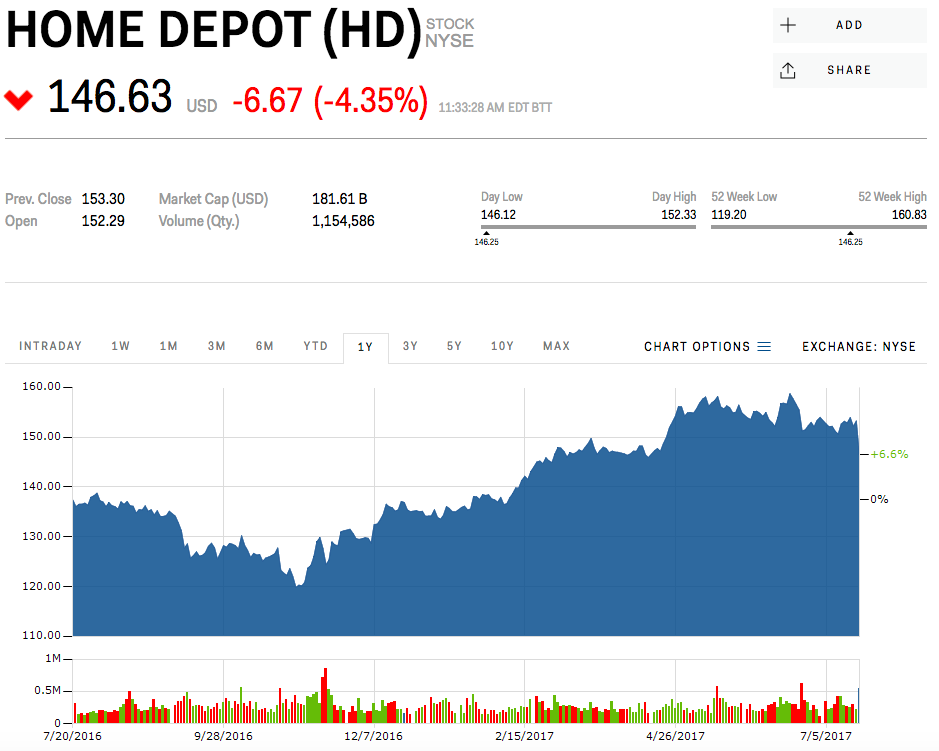Shares of several home-improvement retailers, including the well-known and popular Home Depot (NYSE:$HD), spiraled down on July 20 after reports of a partnership between Sears (NASDAQ:$SHLD) and Amazon (NASDAQ:$AMZN).
Sears announced that it is currently planning to sell its Kenmore-branded appliances on Amazon, suggesting that Amazon will be seriously breaking into appliance retail. Sears is also planning to start distributing smart appliances that are run by Amazon’s popular AI Alexa.
The partnership, while detrimental for home-improvement retailers’ stocks today, could be the turnaround Sears has been looking for. The company’s stock rose more than 15% today after months of falling. Sears had looked like it was headed for bankruptcy after closing more than 200 of its locations this year.
Amazon has been causing quite a detrimental fall in the retail industry lately, as online shopping becomes more desirable than physically going to brick-and-mortar stores. As such, stocks of companies within industries such as groceries have been affected as Amazon expands its reach beyond apparel retail. This can be seen with the hit grocers were subjected to after news arose of Amazon’s plans to acquire Whole Foods (NASDAQ:$WFM). Now, with this deal with Sears, investors are questioning if home-improvement retailers can survive the competition that Amazon poses.
Home-improvement retailers were originally thought to be safe from Amazon’s retail takeover thanks to the fact that sales have largely been tied to store visits. Strong demand for housing as well as rising prices have also been beneficial to home-improvement retailers, especially if renovations are done before a property goes on sale. Since the news this morning, however, Home Depot – the largest home-improvement retailer in the U.S. – saw its stock fall by about 4% as it entered closing on July 20. Lowe’s (NYSE:$LOW), Whirlpool (NYSE:$WHR), and Best Buy (NYSE:$BBY) also saw their stock prices decrease.
But investors shouldn’t be too concerned just yet. According to Bloomberg, investment firm Oppenheimer (NYSE:$OPY) said that the market had overreacted to the news. Home Depot has been quite active in online retail as well, its digital sales rising by 23% in this year’s first quarter compared to last year’s first quarter. In addition to improved sales, delivery time for customers’ web orders have also improved thanks to Home Depot’s strategy of completing these orders in local stores.
Home Depot, along with other similar home-improvement retailers, also hold a key advantage in that consumers could still prefer to physically shop for renovation products like paint, bathroom fixtures, and flooring instead of purchasing these things online.
“While appliances are well-suited for online research, most consumers prefer to then visit a brick & mortar store,” Alan Rifkin, an analyst at BTIG, noted. “We do not believe the availability of Kenmore products on Amazon will draw meaningful incremental traffic away from the brick & mortar retailers to Amazon, given Kenmore’s declining brand and consultative nature of a major expenditure such as appliances.”
As such, investors won’t know how the Sears and Amazon deal will affect the future of home-improvement retailers until much later. Thorough research and consideration should be done before investors either pull out of their investments in home-improvement retail or invest in them.

Featured Image: twitter









